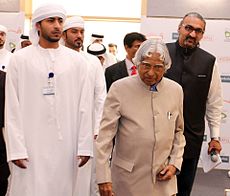Dr. A.P.J. Abdul Kalam
| A. P. J. Abdul Kalam | |
|---|---|
| ஆ. ப. ஜெ. அப்துல் கலாம் | |
 |
|
| 11th President of India | |
|
In office 25 July 2002 – 25 July 2007 |
|
| Prime Minister |
Atal Bihari Vajpayee Manmohan Singh |
| Vice President |
Krishan Kant Bhairon Singh Shekhawat |
| Preceded by | K. R. Narayanan |
| Succeeded by | Pratibha Patil |
| Personal details | |
| Born |
Avul Pakir Jainulabdeen Abdul Kalam 15 October 1931 Rameswaram, Ramnad District, Madras Presidency, British India (now in Ramanathapuram District, Tamil Nadu, India |
| Died | 27 July 2015 (aged 83) Shillong, Meghalaya, India |
| Cause of death | Cardiac arrest (Stroke) |
| Nationality | Indian |
| Alma mater |
St. Joseph's College, Tiruchirappalli Madras Institute of Technology |
| Profession |
Professor Author Aerospace scientist |
| Religion | Islam |
| Awards |
Bharat Ratna 1997 Padma Vibhushan 1990 Padma Bhushan 1981 |
| Signature |  |
| Website | www |
Avul Pakir Jainulabdeen Abdul Kalam better known as A.P.J. Abdul Kalam ![]() i/ˈæbdʊl kəˈlɑːm/; (15 October 1931 – 27 July 2015) was the 11th President of India from 2002 to 2007. A career scientist turned statesman, Kalam was born and raised in Rameswaram, Tamil Nadu, and studied physics and aerospace engineering. He spent the next four decades as a scientist and science administrator, mainly at the Defence Research and Development Organisation (DRDO) and Indian Space Research Organisation (ISRO) and was intimately involved in India's civilian space programme and military missile development efforts. He thus came to be known as the Missile Man of India for his work on the development of ballistic missile and launch vehicle technology. He also played a pivotal organisational, technical, and political role in India's Pokhran-II nuclear tests in 1998, the first since the original nuclear test by India in 1974.
i/ˈæbdʊl kəˈlɑːm/; (15 October 1931 – 27 July 2015) was the 11th President of India from 2002 to 2007. A career scientist turned statesman, Kalam was born and raised in Rameswaram, Tamil Nadu, and studied physics and aerospace engineering. He spent the next four decades as a scientist and science administrator, mainly at the Defence Research and Development Organisation (DRDO) and Indian Space Research Organisation (ISRO) and was intimately involved in India's civilian space programme and military missile development efforts. He thus came to be known as the Missile Man of India for his work on the development of ballistic missile and launch vehicle technology. He also played a pivotal organisational, technical, and political role in India's Pokhran-II nuclear tests in 1998, the first since the original nuclear test by India in 1974.
...
Wikipedia
